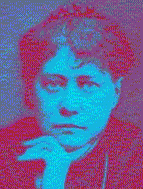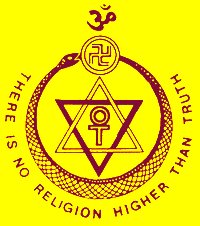The Key to Theosophy

Helena
Petrovna Blavatsky
1831
-1891
_______________________
The Key to Theosophy
By
Helena Petrovna Blavatsky
The Difference Between
Faith and Knowledge,
Or Blind and Reasoned Faith
Q. You say that they accept and believe in the doctrines of
Theosophy. But, as
they do not belong to those Adepts you have just mentioned, then
they must
accept your teachings on blind faith. In what does this differ from
that of
conventional religions?
A. As it differs on almost all the other points, so it differs on
this one. What
you call "faith," and that which is blind faith, in
reality, and with regard to
the dogmas of the Christian religions, becomes with us
"knowledge," the logical
sequence of things we know, about facts in nature. Your Doctrines
are based upon interpretation, therefore, upon the secondhandtestimony of
Seers; ours upon the invariable and unvarying testimony of Seers. The ordinary
Christian theology, for instance, holds that man is a creature of God, of three
component
parts-body, soul, and spirit-all essential to his integrity, and
all, either in
the gross form of physical earthly existence or in the etherealized
form of
post-resurrection experience, needed to so constitute him forever,
each man
having thus a permanent existence separate from other men, and from
the Divine.
Theosophy, on the other hand, holds that man, being an emanation
from the
Unknown, yet ever present and infinite Divine Essence, his body and
everything
else is impermanent, hence an illusion; Spirit alone in him being
the one
enduring substance, and even that losing its separated individuality
at the
moment of its complete reunion with the Universal Spirit.
Q. If we lose even our individuality, then it becomes simply
annihilation.
A. I say it does not,since I speak of separate, not of universal
individuality.
The latter becomes as a part transformed into the whole; the
dewdropis not
evaporated, but becomes the sea. Is physical man annihilated,when
from a fetus
he becomes an old man? What kind of Satanic pride must be ours if
we place our infinitesimally small consciousness and individuality higher than
the universal
and infinite consciousness!
Q. It follows, then, that there is, de facto, no man, but all is
Spirit?
A. You are mistaken. It thus follows that the union of Spirit with
matter is but
temporary; or, to put it more clearly, since Spirit and matter are
one, being
the two opposite poles of the universal manifested substance-that
Spirit loses
its right to the name so long as the smallest particle and atom of
its
manifesting substance still clings to any form, the result of
differentiation.
To believe otherwise is blind faith.
Q. Thus it is on knowledge,not on faith, that you assert that the
permanent
principle, the Spirit, simply makes a transit through matter?
A. I would put it otherwise and say-we assert that the appearance
of the
permanent and oneprinciple, Spirit, as matter is transient, and,
therefore, no
better than an illusion.
Q. Very well; and this, given out on knowledge not faith?
A. Just so. But as I see very well what you are driving at, I may just
as well
tell you that we hold faith, such as you advocate, to be a mental
disease, and
real faith, i.e., the pistis of the Greeks, as "belief based
on knowledge,"
whether supplied by the evidence of physical or spiritual senses.
Q. What do you mean?
A. I mean, if it is the difference between the two that you want to
know, then I
can tell you that between faith on authority and faith on one's
spiritual
intuition, there is a very great difference.
Q. What is it?
A. One is human credulity and superstition, the other human belief
and
intuition.As Professor Alexander Wilder says in his
"Introduction to the
Eleusinian Mysteries,"
It is ignorance which leads to profanation. Men ridicule what they
do not
properly understand … The undercurrent of this world is set towards
one goal;
and inside of human credulity … is a power almost infinite, a holy
faith capable
of apprehending the most supreme truths of all existence.
Those who limit that "credulity" to human authoritative
dogmas alone, will never
fathom that power nor even perceive it in their natures. It is
stuck fast to the
external plane and is unable to bring forth into play the essence
that rules it;
for to do this they have to claim their right of private judgment,
and this they
never dare to do.
Q. And is it that "intuition" which forces you to reject
God as a personal
Father, Ruler, and Governor of the Universe?
A. Precisely. We believe in an ever unknowable Principle, because
blind
aberration alone can make one maintain that the Universe, thinking
man, and all
the marvels contained even in the world of matter, could have grown
without some intelligent powers to bring about the extraordinarily wise
arrangement of all
its parts. Nature may err, and often does, in its details and the
external
manifestations of its materials, never in its inner causes and
results. Ancient
pagans held on this question far more philosophical views than
modern
philosophers, whether Agnostics, Materialists, or Christians; and
no pagan
writer has ever yet advanced the proposition that cruelty and mercy
are not
finite feelings, and can therefore be made the attributes of an
infinite god.
Their gods, therefore, were all finite. The Siamese author of the
Wheel of the
Law,expresses the same idea about your personal god as we do; he
says:
A Buddhist might believe in the existence of a god, sublime above
all human
qualities and attributes-a perfect god, above love, and hatred, and
jealousy,
calmly resting in a quietude that nothing could disturb, and of
such a god he
would speak no disparagement not from a desire to please him or
fear to offend
him, but from natural veneration; but he cannot understand a god
with the
attributes and qualities of men, a god who loves and hates, and
shows anger; a
Deity who, whether described as by Christian Missionaries or by
Mohammedans or Brahmins, or Jews, falls below his standard of even an ordinary
good man.
Q. Faith for faith, is not the faith of the Christian who believes,
in his human
helplessness and humility, that there is a merciful Father in
Heaven who will
protect him from temptation, help him in life, and forgive him his
transgressions, better than the cold and proud, almost fatalistic
faith of the
Buddhists, Vedantins, and Theosophists?
A. Persist in calling our belief "faith" if you will. But
once we are again on
this ever-recurring question, I ask in my turn: faith for faith, is
not the one
based on strict logic and reason better than the one which is based
simply on
human authority or-hero-worship?Our "faith" has all the
logical force of the
arithmetical truism that two and two will produce four. Your faith
is like the
logic of some emotional women, of whom Tourgenyeff said that for them
two and two were generally five, and a tallow candle into the bargain. Yours is
a faith, moreover, which clashes not only with every conceivable view of
justice and logic, but which, if analyzed, leads man to his moral perdition,
checks the
progress of mankind, and positively making of might,
right-transforms every
second man into a Cain to his brother Abel.
Q. What do you allude to?
__________________________

Find answers to more questions
with these Theosophy links
Dave’s
Streetwise Theosophy Boards
The Theosophy Website that
Welcomes Absolute Beginners
If you run a Theosophy Study Group,
please feel free
to make use of the material on this
Website
The Most Basic Theosophy
Website in the Universe
A quick overview of Theosophy
and the Theosophical Society
If you run a Theosophy Study Group you
can use this as an introductory handout.

Cardiff Theosophical Society meetings
are informal
and there’s always a cup of tea afterwards
The
Cardiff Theosophical Society Website
The
National Wales Theosophy Website
This is for
everybody not just people in Wales
Theosophy Cardiff’s Instant Guide
General pages
about Wales, Welsh History
and The History
of Theosophy in Wales
Independent Theosophy Blog
One liners and quick explanations
About aspects of Theosophy
H P Blavatsky is usually the only
Theosophist that most people have
ever
heard of. Let’s put that right
Lentil burgers, a
thousand press ups before breakfast and
the daily 25 mile
run may put it off for a while but death
seems to get most
of us in the end. We are pleased to
present for your
consideration, a definitive work on the
subject by a
Student of Katherine Tingley entitled
An
Independent Theosophical Republic
Links to Free Online Theosophy
Study Resources; Courses, Writings,
No
Aardvarks were harmed in the
The Spiritual Home of Urban Theosophy
The Earth Base for Evolutionary Theosophy
Classic Introductory
Theosophy Text
A Text Book of Theosophy By C
What Theosophy Is From the Absolute to Man
The Formation of a Solar System The Evolution of Life
The Constitution of Man After Death Reincarnation
The Purpose of Life The Planetary Chains
The Result of Theosophical Study
An Outstanding
Introduction to Theosophy
By a student of
Katherine Tingley
Elementary Theosophy Who is the Man? Body and Soul
Body, Soul and Spirit Reincarnation Karma
Preface
Theosophy and the Masters General Principles
The Earth Chain Body and Astral Body Kama – Desire
Manas Of Reincarnation Reincarnation Continued
Karma Kama Loka
Devachan
Cycles
Arguments Supporting Reincarnation
Differentiation Of Species Missing Links
Psychic Laws, Forces, and Phenomena
Psychic Phenomena and Spiritualism
Quick Explanations with Links to More
Detailed Info
What is Theosophy ? Theosophy Defined (More Detail)
Three Fundamental Propositions Key Concepts of Theosophy
Cosmogenesis
Anthropogenesis
Root Races
Karma
Ascended Masters After Death States Reincarnation
The Seven Principles of Man Helena Petrovna Blavatsky
Colonel Henry Steel Olcott William Quan Judge
The Start of the Theosophical Society Theosophical Society Presidents
History of the Theosophical Society Glossaries of Theosophical Terms
History of the Theosophical Society in Wales
The Three Objectives of the Theosophical Society
Explanation of the Theosophical Society Emblem
Karma Fundamental Principles Laws: Natural and Man-Made The Law of Laws
The Eternal Now
Succession
Causation The Laws of Nature A Lesson of The Law
Karma Does Not Crush Apply This Law
Man in The Three Worlds Understand The Truth
Man and His Surroundings The Three Fates
The Pair of Triplets Thought, The Builder
Practical Meditation Will and Desire
The Mastery of Desire Two Other Points
The Third Thread Perfect Justice
Our Environment
Our Kith and Kin Our Nation
The Light for a Good Man Knowledge of Law The Opposing Schools
The More Modern View Self-Examination Out of the Past
Old Friendships
We Grow By Giving Collective Karma Family Karma
National Karma
India’s Karma
National Disasters
Try these if you are looking
for a
local Theosophy Group or Centre
UK Listing of Theosophical Groups